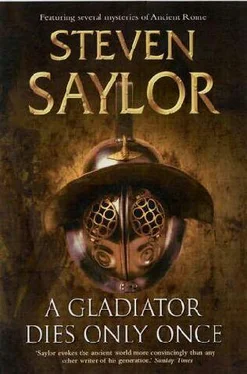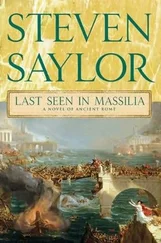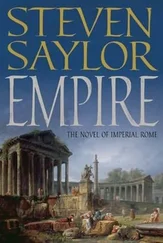Steven Saylor - A Gladiator Dies Only Once
Здесь есть возможность читать онлайн «Steven Saylor - A Gladiator Dies Only Once» весь текст электронной книги совершенно бесплатно (целиком полную версию без сокращений). В некоторых случаях можно слушать аудио, скачать через торрент в формате fb2 и присутствует краткое содержание. Жанр: Исторический детектив, на английском языке. Описание произведения, (предисловие) а так же отзывы посетителей доступны на портале библиотеки ЛибКат.
- Название:A Gladiator Dies Only Once
- Автор:
- Жанр:
- Год:неизвестен
- ISBN:нет данных
- Рейтинг книги:5 / 5. Голосов: 1
-
Избранное:Добавить в избранное
- Отзывы:
-
Ваша оценка:
- 100
- 1
- 2
- 3
- 4
- 5
A Gladiator Dies Only Once: краткое содержание, описание и аннотация
Предлагаем к чтению аннотацию, описание, краткое содержание или предисловие (зависит от того, что написал сам автор книги «A Gladiator Dies Only Once»). Если вы не нашли необходимую информацию о книге — напишите в комментариях, мы постараемся отыскать её.
A Gladiator Dies Only Once — читать онлайн бесплатно полную книгу (весь текст) целиком
Ниже представлен текст книги, разбитый по страницам. Система сохранения места последней прочитанной страницы, позволяет с удобством читать онлайн бесплатно книгу «A Gladiator Dies Only Once», без необходимости каждый раз заново искать на чём Вы остановились. Поставьте закладку, и сможете в любой момент перейти на страницу, на которой закончили чтение.
Интервал:
Закладка:
I returned the gesture. Eco did likewise, and the three of us sipped in unison. The local vintage wasn't bad. "I appreciate the welcome," I said, which was true. Indeed, Tiro's unexpected appear-ance at the dingy inn down at the harbor where Eco and I were staying had taken me by complete surprise, and the invitation to dine with Cicero and to spend the night at his rented house surprised me even more. In the five years since Cicero had first employed me (to assist him in the defense of Sextus Roscius, accused of parricide), our relationship had been strictly professional. Cicero generally treated me with a cool diffidence: I was merely the Finder, useful for digging up dirt. I regarded him with wary respect; as an advocate and rising politician, Cicero seemed genuinely interested in justice and truth- but in the end he was, after all, an advocate and a politician.
In other words, we were on friendly terms, but not exactly friends. So I found it curious that he should have invited Eco and me to dine with him purely for pleasure. His twelve months as a government administrator here in Sicily must have been lonely for him indeed if the sight of my face could bring him much enjoyment. "You're not exactly at the end of the world here," I felt obliged to point out. "Sicily isn't all that far from Rome."
"True, true, but far enough to make a man appreciate what Rome has to offer. And far enough so that all the gossip gets a bit distorted on the way here. You must tell me everything that's been happening in the Forum, Gordianus."
"Surely your friends and family keep you informed."
"They write, of course, and some of them have visited. But none of them have your…" He searched for the word. "Your particular perspective." Looking up at the world, he meant, instead of down. "Ah, but now that my year of service is up, I shall soon be back in Rome myself. What a relief it shall be to leave this wretched place behind me. What's that the boy is saying?"
On the dining couch beside me, my mute son had put down his cup and was shaping thoughts in the air with his hands. His pictures were clear enough to me, if not to Cicero: high mountains, broad beaches, stony cliffs. "Eco likes Sicily, or at least the little we've seen of it on this trip. He says that the scenery here is beautiful."
"True enough," Cicero agreed, "though not so true of the people."
"The Greek-speaking population? I thought you adored all things Greek, Cicero."
"All things Greek, perhaps, but not all Greeks." He sighed. "Greek culture is one thing, Gordianus. The art, the temples, the plays, the philosophy, the mathematics, the poetry. But-well, since my other guests haven't yet arrived, I shall speak freely, Roman to
Roman. The Greeks who gave us all that marvelous culture are dust now, and have been for centuries. As for their far-flung progeny, es-pecially in these parts-well, it's sad to see how little they resemble their colonizing ancestors.
"Consider this city: Syracuse, once a beacon of light and learning to the whole of the Mediterranean this side of Italy-the Athens of the west, the rival of Alexandria at its peak. Two hundred years ago, Hiero ruled here, and men like Archimedes walked the beach. Now one finds only the remnants of a proud race, a degraded people, rude and uneducated, without manners or morals. The far-flung colonies of the Greeks have forgotten their forebears. The mantle of civilization has been taken up by us, Gordianus, by Rome. We are the true heir to Greek culture, not the Greeks. Only Romans nowadays have the refinement to truly appreciate, say, a statue by Polyclitus."
"Or is it that only Romans have the money to afford such things?" I suggested. "Or the armies to bring them home by force?"
Cicero wrinkled his nose to show that he found my questions inappropriate, and called for more wine. Beside me, Eco fidgeted on his couch. The early education of my adopted son had been sorely neg-lected, and despite my best efforts, his progress was still hampered by his inability to speak. At fifteen, he was almost a man, but talk of culture, especially from a snob like Cicero, quickly bored him.
"Your year of foreign service has made you even more of a Roman patriot," I remarked. "But if your term is up, and if you find the com-pany of the Greek Sicilians so lacking, I wonder that you don't leave the place at once."
"Right now I'm playing tourist, actually. I was posted to the other half of the island, you see, over in Lilybaeum on the west coast. Syracuse is a stopover on my way home, a last chance to see the sights before I quit Sicily for good. Don't misunderstand me, Gor-dianus. This is a beautiful island, as your son says, resplendent with natural wonders. There are many fine buildings and works of art, and many sites of great historical importance. So much has happened in Sicily in the centuries since the Greeks colonized it- the golden reign of Hiero, the great mathematical discoveries of his friend Archimedes, the Carthaginian invasions, the Roman takeover. There's plenty for a visitor to see and do here in Syracuse." He sipped his wine. "But I don't suppose it's pleasure that's brought you here, Gordianus."
"Eco and I are here strictly on business. A fellow back in Rome hired me to follow the trail of a business partner who absconded with the profits. I tracked the missing man here to Syracuse, but to-day I learned that he's sailed on, probably east to Alexandria. My instructions were to go only as far as Sicily, so as soon as I can book passage, I plan to head back to Rome with the bad news and collect my fee."
"Ah, but now that we've found one another here in a strange city, you must stay with me for a while, Gordianus." Cicero sounded sincere, but then, all politicians do. I suspected the invitation for an extended stay was merely a polite gesture. "What a remarkable livelihood you have," he went on, "hunting down murderers and scoundrels. Of course, one hardly meets a better class of people, being in government service, especially in the provinces. Ah, but here's Tiro!"
Cicero's young secretary gave me a smile and mussed Eco's hair as he passed behind our couches. Eco pretended to take offense and put up his fists like a boxer. Tiro indulged him and did likewise. Tiro had an affable, unassuming nature. I had always found him easier to deal with, and to like, than his master.
"What is it, Tiro?" said Cicero.
"Your other three guests have arrived, Master. Shall I show them in?"
"Yes. Tell the kitchen slaves that they can bring out the first course as soon as we're all settled." Cicero turned back to me. "I hardly know these fellows myself. I was told by friends in Lilybaeum that I should meet them while I was here in Syracuse. Dorotheus and Agathinus are important businessmen, partners in a shipping firm. Margero is said to be a poet, or what passes for a poet in Syracuse nowadays."
Despite his disdainful tone, Cicero made a great show of welcom-ing his guests as they entered the room, springing up from his couch and extending his arms to give them a politician's embrace. He could hardly have been more unctuous had they been a trio of unde-cided voters back in Rome.
The meal, much of it harvested from the sea, was excellent, and the company more genial than Cicero had led me to expect. Dorotheus was a heavyset, round-faced man with a great black beard and a booming voice. He joked continually during the meal, and his good humor was contagious; Eco particularly succumbed to it, often joining his own odd but charming bray to Dorotheus's pealing laughter. From certain bits of conversation that passed between Dorotheus and his business partner, I gathered that both men had cause to be in high spirits, having recently struck some very lucrative deals. Agathinus, however, was more restrained than his partner; he smiled and laughed quietly at Dorotheus's jokes, but said little. Physically, he was quite the opposite of Dorotheus as well, a tall, slender man with a narrow face, a slit of a mouth, and a long nose. They seemed a per-fect example of how a successful partnership can sometimes result from the union of two markedly different natures.
Читать дальшеИнтервал:
Закладка:
Похожие книги на «A Gladiator Dies Only Once»
Представляем Вашему вниманию похожие книги на «A Gladiator Dies Only Once» списком для выбора. Мы отобрали схожую по названию и смыслу литературу в надежде предоставить читателям больше вариантов отыскать новые, интересные, ещё непрочитанные произведения.
Обсуждение, отзывы о книге «A Gladiator Dies Only Once» и просто собственные мнения читателей. Оставьте ваши комментарии, напишите, что Вы думаете о произведении, его смысле или главных героях. Укажите что конкретно понравилось, а что нет, и почему Вы так считаете.










